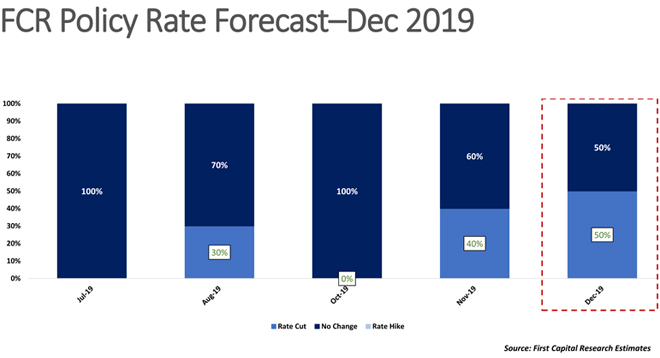Dec 24, 2019 (LBO) – Considering the recent major policy changes, First Capital Research has trimmed down its rate cut probability to 50 percent from the previous expectation of 100 percent probability, specifically due to the tax benefits, moratorium on loans and easing of capital adequacy to stimulate the consumer demand and revive growth in the economy.
"Foreign outflow is not considered a major concern considering the lower level of foreign holding in the Gov. Sec market," the research arm said in its pre-policy analysis.
"However, we are of the view that 50% probability exists for a “No Change” in Monetary Policy as well due to the major benefits. We continue to maintain that SRR is likely to be maintained at the current level."

Pre-Policy Analysis by First Capital Research
Recently provided hefty tax cuts to substantially boost the consumer spending
On 27th Nov 2019, Government announced hefty tax reliefs with the expectation of increasing the consumer spending while boosting the economic growth of the country. We expect measures such as reduction of VAT to 8% (from 15%), removal of NBT and revisions to PAYE tax to increase disposable income of consumers, thereby boosting consumer spending in the economy. However, government’s ability to bridge the revenue loss due to the recent tax revisions will be a concern leading to a risk in 2020. The stimulus package may potentially lead to fiscal slippage, reducing the possibility of further monetary easing in the near term.
Moratorium on top of tax cuts; Capital Adequacy relaxation follows
Three weeks after the hefty tax cuts, Finance Ministry on 20th Dec announced a moratorium on loans for SMEs for one year and an extension of the moratorium of the tourism industry till Dec 2020 which could be considered an additional support to boost the growth in the economy. CBSL has also taken measures to ease the capital adequacy requirement for banks on 20th Dec, which we believe is an added measure to relax constraints of the banks’ capacity to lend.
Fed pause the easing cycle while rating agencies signals a negative outlook for SL
On the external front, Fed left rates unchanged and signaled it would stay on hold through 2020. The move illustrates an end to Fed’s monetary easing cycle, but also suggests no change to policy rates throughout 2020 which is a favourable stance for SL. However, Fitch’s recent downgrade of SL’s Long-Term Foreign-Currency rating outlook to ‘Negative’ from ‘Stable’, signal a potential credit rating downgrade in the future. SL government bond market witnessed an outflow of LKR 16.9Bn since 27th Nov resulting in foreign holding in government securities declining below 2.0%. Though policy easing in the current scenario enhances foreign outflows, the historical low level of foreign holding significantly reduces risk of further outflows.
Delay in Samurai bonds; a cause for concern
Foreign reserves dipped to USD 7.5Bn in Nov 2019, (dipping from USD 7.8Bn in Oct) and continues to remain at comfortable levels. However, the present government has delayed the planned USD 500Mn Samurai bond creating some concern on the back of foreign project loan repayments.
Gradual pick in private credit, but economic growth remains sluggish
Sri Lanka’s economy grew by 2.7% in the 3Q2019, higher than our expectation of 2.2%, indicating a gradual recovery relative to 2Q2019 growth of 1.6%. Private sector credit growth recorded an increase of LKR 26Bn in Oct 2019, illustrating a positive credit growth for the 3rd consecutive month with Jan-Oct 2019 growth at 2.6%, closing in, on our credit growth target of 5% for 2019E. Despite the recovery in growth, credit and economic growth thus far remains below par, leaving room for possible aggressive action on monetary easing. Tax cuts moratorium on loans and easing of capital adequacy levels could be considered as part of the measures.
